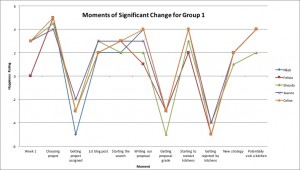Time has been flying by way too fast! Only a few more weeks till we reach final presentations, in other words – it’s crunch time!
Weekly Objectives:
- Contact More Kitchens! This week we’d like to contact the few remaining kitchens on our list that we haven’t yet contacted. We’ve been contacting kitchens by email and phone calls when possible, depending on what information we have.
- New strategies on contacting and visiting kitchens in our assigned area. For the kitchens we have already contacted, we are coming up with new ways of making contact again to hopefully increase our success rate. This will include more phone calls, and using next week’s flexible learning day to actually knock on doors in the Shaughnessy/South Cambie areas. The idea is to expand our reach so we know we have done thorough research and contact attempts. Our other goal is to successfully find a community partner and have a kitchen agree to let us visit and do the survey.
Weekly Achievements:
We have an organization spreadsheet containing a fairly extensive list of all the contacts in our specified areas. These are mainly religious organizations, many of which have some sort of meal servings or kitchens (which have been mentioned on their website). Last week during the flexible learning time we sat down as a group and called or emailed almost every contact in this list. While the feeling of finally stepping into the ‘real world’ and contacting community member was satisfying, the responses were not as great.
As a group we continue to strive in communicate and work well together, which we believe is our biggest achievement in itself!
Moments of Change Workshop Reflection:
For our group, this workshop in tutorial was an awesome strategy for reflecting on the project so far and figuring out where we stand. It was nice to see all of our group members went up and down with the same moments and we actually had very similar feelings throughout our time together so far .
It was helpful to think about moments in the project so far, and find out that we often feel the same way about things that have happened. This definitely helps us feel better about the work we have already done, and also helps us to look forward to the rest of the project that is coming up. We hope that our success in contacting community kitchens will improve in the (very near) future so that we have data to look at and we can draw interesting conclusions in our final report.

We wanted to emphasize how much last weeks lecture really helped us put everything into perspective, get us back on track and keep trying to push through our final weeks with the project. With any goal, when you don’t see an outcome right away it causes a lot of let down and that’s just how we had been feeling after trying to contact kitchens and being denied – thus causing us to have a little scare on what to do next! A quote emphasized through lecture we also thought would be awesome to share: “Without a certain amount of anxiety and risk, there’s a limit to how much learning occurs” (Shulman, 2005, p. 18). With each one of us in the group we automatically thought of different experiences we’ve been in or had where we’ve had certain anxieties or certain boundaries we’d have to jump across to get to where we need. A simple example we’ve all personally gone through – putting yourself out there for the world to see! Whether it’s making new friends in class, or (in connection to our project) taking the time to walk out into the community and represent who we are – UBC LFS students! Even having a few of our group members talking to community partners was nerve-wracking as it was like we were entering this new territory !
The Graceful Dismount
Our group’s final strategy for successful project completion:
- Showing up in person and refraining from using “community kitchens” as it has been a point of confusion for churches that we have contacted. We have contacted around 10 different community kitchens via phone or email. However, we have not had anyone willing to let us survey them. We have gotten a couple of responses from churches saying that they are not “community kitchens” and have turned us down. We think we will have much better results if we follow Sam’s advice and go to the places in person and explain that we are conducting surveys on public spaces with kitchen facilities. Since this coming class is a flexible learning day, our group plans to go to our neighbourhood and visit some churches and community centres in person in hopes of getting kitchen representatives to fill out our surveys.
- We will make sure that all group members are continuously updated with anything that goes on. We already have a Facebook page where we can have constant mobile-friendly updates and open communication about the project – thanks to Facebook, keeping in contact has definitely been the least of our worries! Our page will help us keep track of what community kitchens we have contacted and what other ones we still need to contact. By keeping everyone updated online, we are not wasting time to go over things when we meet in person.
- We plan to visit the kitchens as soon as possible. Once we survey a kitchen, we will start a Google document so we can write down important information that we potentially want to share. Over time, as we visit more community kitchens we will be able to easily distinguish similarities and differences within the kitchens and conclude any fitting trends. This will be of most help when we start to write out final report.
References:
Shulman, L. S. (2005). Pedagogies of uncertainty. Liberal Education, 91(2), 18–25.
